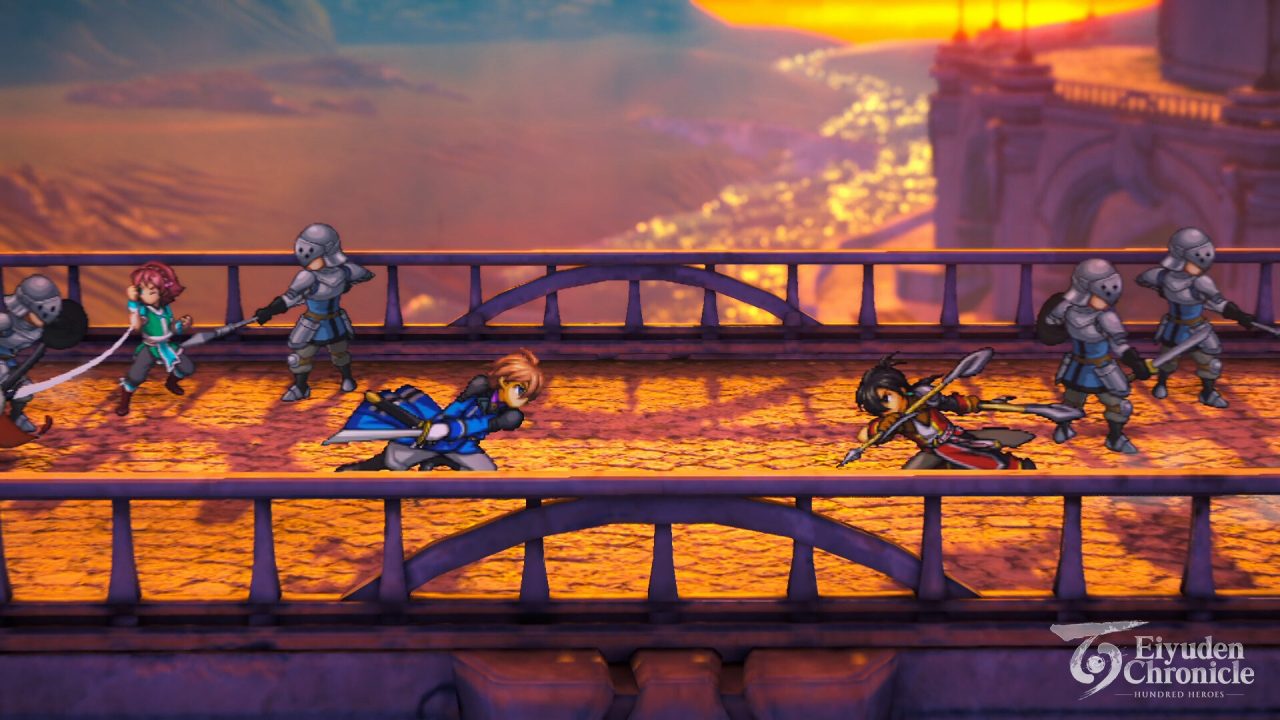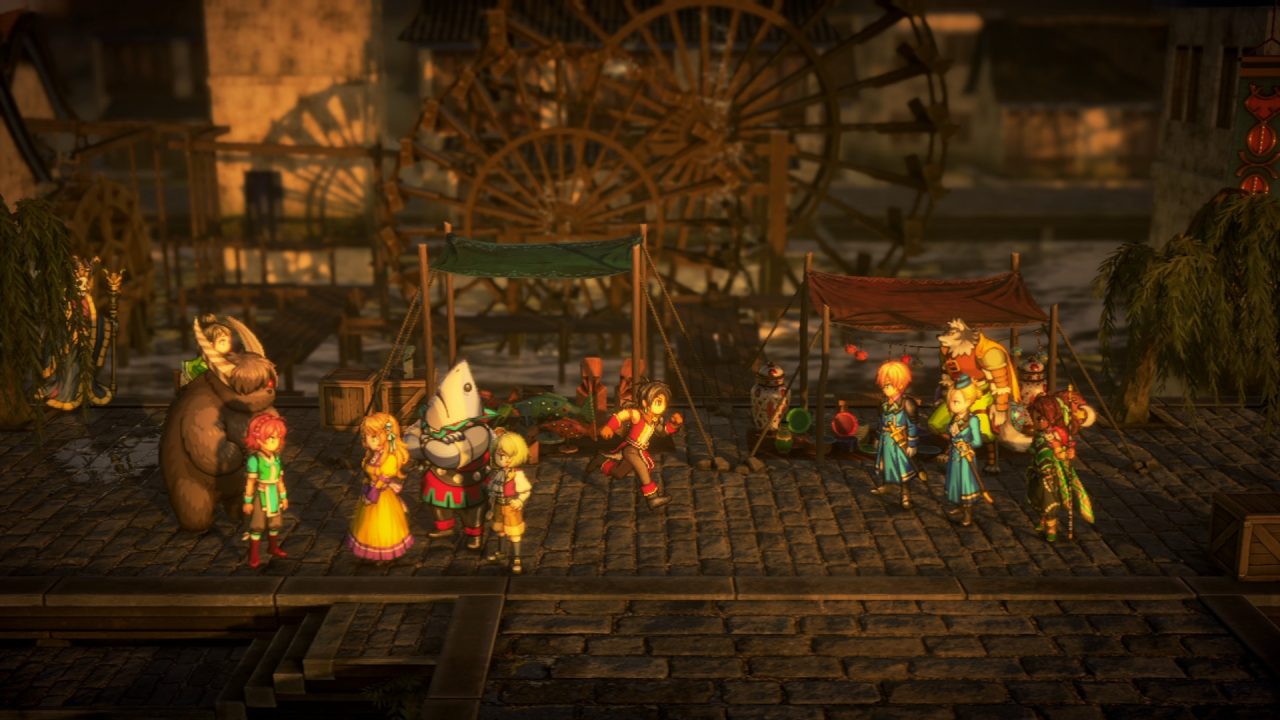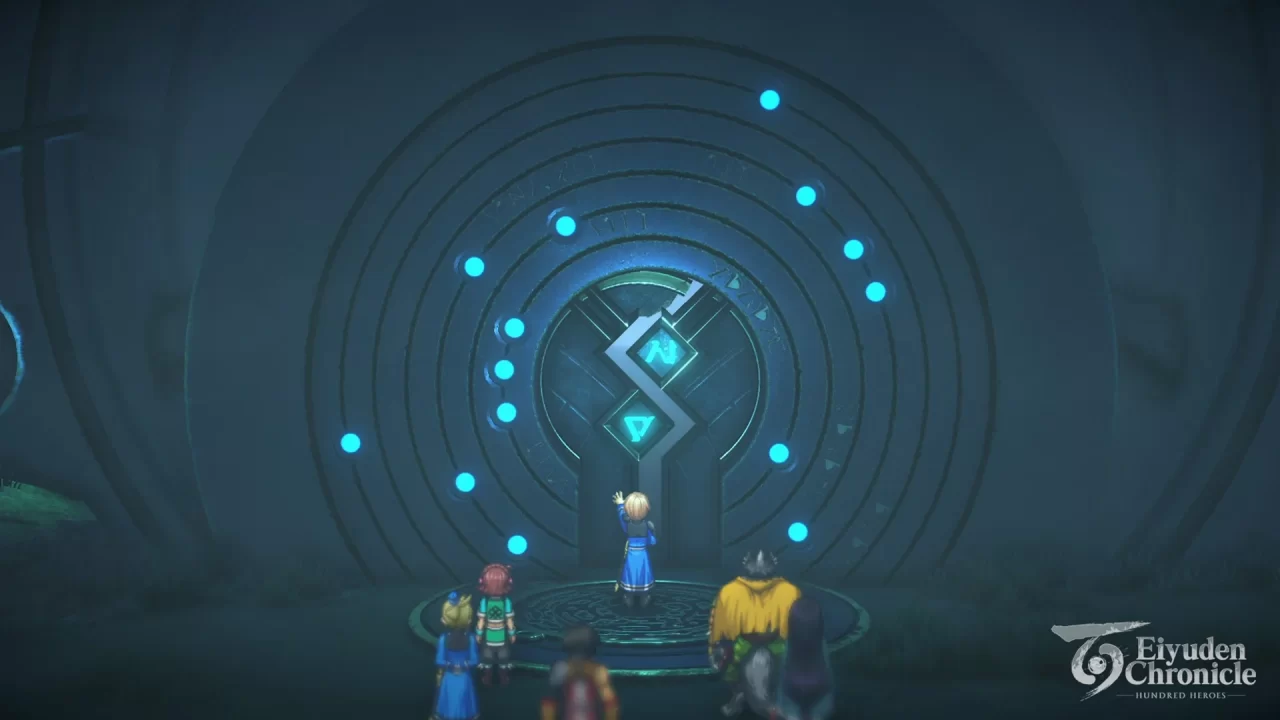Before you even get to the title screen of Eiyuden Chronicle: Hundred Heroes, it hits you with the message, “With our appreciation to all JRPG fans.” They’re not kidding. Hundred Heroes desperately wants to recapture our love of the old classics, particularly Suikoden II. In fact, the similarities practically shout at you. There’s an overworld map! Turn-based combat with six characters! Deep and fun base-building! A continental conflict! Over 100 characters to recruit!
So, yes, Rabbit & Bear Studios tap into what made their forebears so remarkable. But, they forgot the most important part: the soul. Even the weakest Suikoden titles have characters we deeply invest in and people we care about amidst all the political machinations. Luckily, it turns out that Suikoden without a soul is still pretty fun, but, put simply, Eiyuden Chronicle: Hundred Heroes can’t quite match up.
This is most evident in the story, which has a lot of promise in the early going. Nowa is an idealistic member of the Watch, a band of people who serve one of the heads of the League of Nations, Lady Perrielle. The League neighbors the Galdean Empire, which seeks to find the Primal Lenses, powerful versions of the magic-governing Rune-Lenses. Nowa and the Watch team up with a group from the Empire led by Seign, and the two become fast friends. Yet, after finding the Primal Lens and returning to their respective homes, fast-forward six months later and the Empire has yet to pay the Watch or the League their dues. Even with the League bowing down to Dux Aldric, Lady Perrielle refuses to roll over, but the Empire begins to show its more nefarious side. Conflict erupts, and Nowa is suddenly thrust into a leadership role as he is sent on a collision course to go toe-to-toe with his old friend Seign.
Sounds pretty familiar, right? And, honestly, it’s a pretty great setup, even if it takes a little while to get off the ground. But, after a rollicking few hours, things come to a halt as you run to different areas on the map to try to bring the League together. The pacing is all over the place: sometimes things come to a screeching halt, other times they move all too fast, and nothing quite congeals. The biggest issue is that while there are some good moments, particularly involving Seign and Perrielle, Hundred Heroes doesn’t leverage them into anything larger, and my investment in the conflict remained low even in the final hours.
The main culprit for this, as I mentioned before, is that the connection between the characters just isn’t as deep or as strong as any Suikoden game or even many other JRPGs. Despite Nowa being a speaking protagonist, I feel like I don’t know him as well as some silent protagonists, and I never bought him as a leader of a larger group. And, while they might market the game as having three protagonists, Nowa is the show’s star, with Seign and Marisa only getting brief moments in the sun.
That almost “blank slate” approach might work if the characters surrounding Nowa were stronger, but by and large, they’re not. I can boil virtually every character down to a single word. Lian is brash. Seign is troubled. Mio is mysterious. Dux Aldric is evil. The mostly laughably flat voice acting certainly doesn’t help with this, either. The few attempts the writers make to flesh out these characters beyond their tropes fall flat, even the promising relationship between Nowa and Seign. When there isn’t much of a history between these characters to begin with, it lacks that personal touch that we get with the Suikoden games. At the end of the day, it’s just standard, boilerplate good vs. evil JRPG stuff. I guess they did tell me that up front, but I was hoping for more.
Luckily, all of Suikoden‘s gameplay trappings are here, and almost every single one is downright delightful, down to recruiting those many characters. In total, there are 120 different “heroes” you can pull into your ranks, and recruiting them is varied and mostly fair. Some will ask you to get an item, others have a fun little side quest associated with them, and (thankfully) a few join you outright when you chat with them. Granted, without a guide I wasn’t able to find everyone, and some of the recruitment requirements were a little obtuse for my liking (I’m looking at you, fisherman and trader), but every time I found a new party member, I got that same dopamine hit from all those years ago.
That brings me to one of the few ways Eiyuden Chronicle: Hundred Heroes surpasses its forebears: the base building. Instead of simply getting upgrades as you recruit more characters, there’s a massive grid for you to fill. When you get the right materials (or person), you can build new areas around the castle, upgrade what that area does, or even unlock secrets. There’s also a ton to do around the castle: hot springs, theater shows, card games, and they even brought the cooking minigame back. Sure, you’re not going to get the customization options you might in more fully fledged simulation games, but it struck just the right balance for me between simplicity and complexity in this type of game.
Of course, as Rabbit & Bear said, this is a JRPG, so there’s plenty of combat. In fact, all three aspects you’re familiar with from the Suikoden series (normal, duel, army) make a return, with varying levels of success. I won’t go too in-depth on the standard turn-based fights here since Audra Bowling already did a fabulous job covering that in her preview. They are six-person battles, with three people in the front and three in the back. Each character is assigned either an S, meaning they need to be in the front, an M, which means they can be in either, or an L, which means they need to attack from long range. There’s also some customization for your characters—each has a number of rune slots where you can assign them magical abilities, attacks, and stat boosts, while more unlock as you level the characters. Luckily, while bring given characters along is sometimes mandatory, you can choose to put some in secondary positions, allowing you to keep your preferred party in battle (similar to Suikoden V). There’s also a handy auto-battle function where you can even customize your characters’ actions to your preferences, and the AI is generally pretty smart.
Otherwise, it’s standard for a turn-based system but missing a few key ingredients, making it a little less enjoyable. As is tradition, expect random encounters. Luckily, the encounter rate is pretty low, so this didn’t bother me too much. Inventory space is limited, so when you need that healing item, stock up and leave room for other drops at the end of battle. The biggest issue is that battles are downright slow compared to some of the earliest Suikoden titles. I loved turning on auto-battle in those games because I knew the fight would be quick as many attacks fired off at once. That doesn’t happen here. It might seem like a minor complaint, but that, mixed with the slow UI in the menus and the somewhat slow pacing at times, makes the whole game feel slightly sedate and sluggish.
Both duels and army battles in Hundred Heroes are a step down from Suikoden, too. Duels are often scripted, and while you have some choices in terms of how you react, you inevitably take some damage. I found that choosing the attack command every time worked best. Army battles fare even worse. They’re remarkably simple: you have a number of units, and you can switch out who is in each unit, but there’s no real need to. You move units around a grid and can have three units on a tile at a time. The idea is to get more units on a grid than the opponent when you get in a battle. If you do, you are likely to do more damage and cause them to retreat. Yep. That’s it. Even the rock-paper-scissors battles in the original Suikoden were doing more than that, and while I enjoyed mopping up my opponents every time with simple strategies, I was hoping for a bit more.
My hopes were mostly met with the look and sound, though they aren’t without their issues, either. Let’s get one thing established: the backgrounds look gorgeous. The lighting in particular is a real treat. On the other hand, while the spritework is well done, it’s just not very expressive. Don’t get me wrong, the animations are crisp and clean, but characters just don’t move a whole lot outside of combat, further dampening the characterization. The game also occasionally struggles to maintain frames on my Steam Deck, sometimes dropping to 15 fps running through particularly busy areas. None of it is a huge deal, but it’s sometimes distracting. In terms of the sound, outside of the mostly mediocre voice work, it’s solid. Not too remarkable, and it doesn’t seem to have a distinctive style, which might be due to multiple people (such as Motoi Sakuraba and Michiko Naruke) working on the soundtrack. It was pleasant and never jarring, but I honestly can’t recall a single track outside of the killer main theme while I’m writing this.
Indeed, Eiyuden Chronicle: Hundred Heroes is a JRPG through and through. But does it live up to its most obvious inspirations? Absolutely not. It lacks the heart and soul of the series that most obviously inspired it, and it’s messy around the edges. But it’s not all bad. The base building, character recruitment, and vibes, as the kids say, are right on. So, while Hundred Heroes might not have lived up to my admittedly sky-high expectations, if you’re looking for an old-school JRPG experience with some modern conveniences, this is the place to go. Just don’t expect greatness like I did. You’ll just be disappointed.






